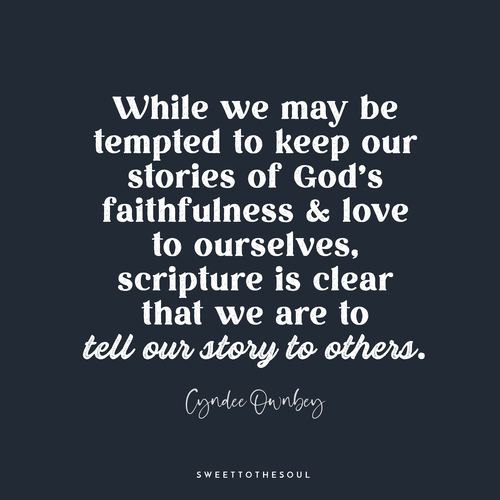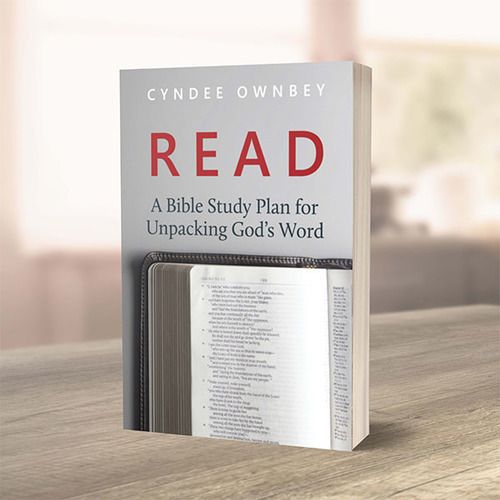Sharing Your Faith Story

“Always be prepared to give an answer to everyone who asks you to give the reason for the hope that you have.” 1 Peter 3:15 ESV
Her name faded from memory years ago, but her story stuck with me.
I heard Susan, let’s call her, speak at the first women’s ministry event I remember attending. Her story wasn’t flashy or dramatic, but it resonated deeply with me. Susan spoke about growing up in the church and realizing as an adult she didn’t have a personal relationship with Christ. She knew who God was, but she didn’t know Him personally.
Susan admitted that she previously struggled to share her story of coming to faith because it lacked the drama and action of so many other faith stories she had heard. There was no earthquake moment. No tragic circumstance. No story that would bring an audience to tears. Little did she realize that her story had me fighting back tears!
As she spoke God connected the dots of my conversion in a new way. Hearing her story finally helped me put into words my own story. I, too, grew up in the church but lacked that personal relationship with God. I thought because I knew who Jesus was and I was a “good girl”, I was headed to Heaven when I died. It wasn’t until I was a young mom that I realized there was more to being a Christian. Knowing who God is and knowing God are two completely different things.
If you’ve ever struggled to put into words how God has been at work in your life, this article is for you! I’d love to be your Susan – to help put your faith stories into words so that other people in your life can hear about God’s faithfulness.
I heard Susan, let’s call her, speak at the first women’s ministry event I remember attending. Her story wasn’t flashy or dramatic, but it resonated deeply with me. Susan spoke about growing up in the church and realizing as an adult she didn’t have a personal relationship with Christ. She knew who God was, but she didn’t know Him personally.
Susan admitted that she previously struggled to share her story of coming to faith because it lacked the drama and action of so many other faith stories she had heard. There was no earthquake moment. No tragic circumstance. No story that would bring an audience to tears. Little did she realize that her story had me fighting back tears!
As she spoke God connected the dots of my conversion in a new way. Hearing her story finally helped me put into words my own story. I, too, grew up in the church but lacked that personal relationship with God. I thought because I knew who Jesus was and I was a “good girl”, I was headed to Heaven when I died. It wasn’t until I was a young mom that I realized there was more to being a Christian. Knowing who God is and knowing God are two completely different things.
If you’ve ever struggled to put into words how God has been at work in your life, this article is for you! I’d love to be your Susan – to help put your faith stories into words so that other people in your life can hear about God’s faithfulness.

If you’ve ever been asked to share your “testimony”, you may be familiar with that feeling of dread and fear that often accompanies such a serious request.
A testimony is often defined as the personal retelling of the moment of conversion. It’s a story of an encounter with Christ, the moment of salvation. The Merriam-Webster Online Dictionary defines a religious testimony as “a public profession of religious experience.” While a testimony is and can be about the singular point at which we accepted Christ, a testimony can also communicate any experience we’ve had with Christ.
I’ve found swapping out that scary word “testimony” with “faith story” relieves a lot of the pressure we place on ourselves. Stories are familiar and stories are relatable.
Faith stories:
Sharing our stories can inspire other people to look for God’s fingerprints on their current situation and circumstances. While we may be tempted to keep our stories of God’s faithfulness and love to ourselves, scripture is clear that we are to tell our story to others.
A testimony is often defined as the personal retelling of the moment of conversion. It’s a story of an encounter with Christ, the moment of salvation. The Merriam-Webster Online Dictionary defines a religious testimony as “a public profession of religious experience.” While a testimony is and can be about the singular point at which we accepted Christ, a testimony can also communicate any experience we’ve had with Christ.
I’ve found swapping out that scary word “testimony” with “faith story” relieves a lot of the pressure we place on ourselves. Stories are familiar and stories are relatable.
Faith stories:
- Give hope
- Provide encouragement
- Create connection
- Model obedience
- Provide testimony of God’s faithfulness and love
Sharing our stories can inspire other people to look for God’s fingerprints on their current situation and circumstances. While we may be tempted to keep our stories of God’s faithfulness and love to ourselves, scripture is clear that we are to tell our story to others.
We are to make known what God has done.
“Give praise to the LORD, proclaim his name; make known among the nations what he has done.” 1 Chronicles 16:8 NIV
People cannot believe in God if they’ve never heard about God.
“But how can they call on him to save them unless they believe in him? And how can they believe in him if they have never heard about him? And how can they hear about him unless someone tells them?” Romans 10:14 NLT
Our stories give the reason for the hope that we have in Christ.
“Always be prepared to give an answer to everyone who asks you to give the reason for the hope that you have.” 1 Peter 3:15 NIV
We can offer an eye-witness account of God in action.
“But you will receive power when the Holy Spirit comes on you; and you will be my witnesses in Jerusalem, and in all Judea and Samaria, and to the ends of the earth.” Acts 1:8 NIV
We can comfort others with the comfort we received from God.
“Praise be to the God and Father of our Lord Jesus Christ, the Father of compassion and the God of all comfort, who comforts us in all our troubles, so that we can comfort those in any trouble with the comfort we ourselves receive from God. For just as we share abundantly in the sufferings of Christ, so also our comfort abounds through Christ.” 2 Corinthians 1:3–5 ESV

Yet, our minds often overcomplicate the sharing of our faith stories. What do I include? How many details do I share? How long should I talk?
John 9 offers a simple recipe for sharing our stories. Here we find the story of Jesus giving sight to a blind man. When asked what had happened, the blind man replied, “The man they call Jesus made some mud and put it on my eyes. He told me to go to Siloam and wash. So I went and washed, and then I could see.” John 9:11 NIV.
While our faith story might not be as short as those three sentences, the format is one we can easily follow.
The story consists of three parts:
In John 9 we see:
As we think through what happened or changed in our life, we want to make certain our story focuses on what God did. And then as we share how we are different, we want to include the transformation God did in our life.
John 9 offers a simple recipe for sharing our stories. Here we find the story of Jesus giving sight to a blind man. When asked what had happened, the blind man replied, “The man they call Jesus made some mud and put it on my eyes. He told me to go to Siloam and wash. So I went and washed, and then I could see.” John 9:11 NIV.
While our faith story might not be as short as those three sentences, the format is one we can easily follow.
The story consists of three parts:
- How I was
- What happened
- How I am now
In John 9 we see:
- The man was blind.
- Jesus made some mud, put it on his eyes, and told him to wash it off.
- Now he can see.
As we think through what happened or changed in our life, we want to make certain our story focuses on what God did. And then as we share how we are different, we want to include the transformation God did in our life.
Read a devotional series about giving testimony in Issue 4 of Sweet To The Soul FAITH Magazine
I find these three C’s helpful in shaping what I am sharing:
Faith stories that are current, concise, and Christ-centered will ensure the words we share give glory to God.
I’ve heard it said that we should speak from our scars, and not from our wounds. I’ve found these to be wise words as I’ve watched women share on a couple of occasions faith stories that were more about their feelings than God’s healing.
Here are a few other things to consider when sharing your story:
- Current - Our stories should be current, focusing on a recent lesson (within the last year, if possible). Keeping it current reminds others that God is always at work!
- Concise – Our stories don’t need to be lengthy. Even if we’re sharing our faith story publicly, we’ve not been asked to be the keynote speaker or teach a Bible lesson. What we share should last between five and ten minutes, no more. Practice sharing it. Record yourself and listen to make sure your story is coming across as intended. If you’re speaking in front of a group, jot down a few notes so you don’t lose focus.
- Christ-centered – Our faith stories should be focused on what God has done, not on dramatic details. It’s about Him, not about us. We want others who hear our story to remember what God accomplished through us or the circumstance. When our eyes and words are focused on God, others see that and can learn by our example.
Faith stories that are current, concise, and Christ-centered will ensure the words we share give glory to God.
I’ve heard it said that we should speak from our scars, and not from our wounds. I’ve found these to be wise words as I’ve watched women share on a couple of occasions faith stories that were more about their feelings than God’s healing.
Here are a few other things to consider when sharing your story:
- Please do not share anything that would embarrass someone or lead to gossip.
- Protect your spouse, your family, and anyone who is a part of your story.
- You want to be more general than specific, especially when sharing with a group.
- Be prayerful and careful with details you share.
- Whenever possible get permission and input from anyone that is a part of your story.

For example, if you are sharing about a hard season in your marriage, your spouse needs to be completely aware and on board with what you are sharing. The specific details of that hard season are for you, your husband, and God to know. Hearing someone reflect on God’s faithfulness in difficult circumstances can be an encouragement.
What story is it that you sense God wants you to share? Do you need to tell how God has provided for you or your family? Is there something God has rescued you from? Has God healed a relationship or helped you to overcome a loss?
You may find it helpful to write down your story. Journal all the nitty-gritty details and then decide what parts are for public consumption and which stay between you and God.
I pray we’ll embrace the opportunities God gives us to be a witness (Acts 1:8), offer comfort (2 Corinthians 1:3–5), proclaim God’s power (1 Chronicles 16:8), and give a reason for our hope (1 Peter 3:15).
Blessings Soul Friends,
What story is it that you sense God wants you to share? Do you need to tell how God has provided for you or your family? Is there something God has rescued you from? Has God healed a relationship or helped you to overcome a loss?
You may find it helpful to write down your story. Journal all the nitty-gritty details and then decide what parts are for public consumption and which stay between you and God.
I pray we’ll embrace the opportunities God gives us to be a witness (Acts 1:8), offer comfort (2 Corinthians 1:3–5), proclaim God’s power (1 Chronicles 16:8), and give a reason for our hope (1 Peter 3:15).
Blessings Soul Friends,
Cyndee
Diving Deeper
- What keeps you from sharing your faith story?
- Which of Cyndee’s recommended 3 C’s do you need to focus on in order to become more comfortable sharing your faith story? Share your answers in the comments.
- Then let’s all read through the comments and offer our prayers for all those who are struggling. Just imagine how joining together in these prayers can help multiply God’s Kingdom!
Resources
Read: A Bible Study Plan for Unpacking God’s Word
Designed to help you study God’s Word on your own using a simple four-step process – Record, Explore, Apply, and Do. In less than 20 minutes a day, you’ll develop healthy Bible study habits and go deeper in your time with God. Includes over 6 months of READ Worksheets.
LEARN MORE
Designed to help you study God’s Word on your own using a simple four-step process – Record, Explore, Apply, and Do. In less than 20 minutes a day, you’ll develop healthy Bible study habits and go deeper in your time with God. Includes over 6 months of READ Worksheets.
LEARN MORE
Cyndee Ownbey, author of Rethinking Women’s Ministry, serves as a mentor to thousands of women’s ministry leaders through her website, podcast, and Facebook community, Women’s Ministry Toolbox. Pulling from over twenty years of ministry experience, Cyndee shares tried-and-true women's ministry tips and ideas equipping leaders to cultivate a Christ-focused community.

Recent
Archive
2023
2022
January
February
March
April
May
June
August
December
2021
June
November



12 Comments
Believe like a little child
I would like to share my story and am all for suggestions 8n my circumstances first of all I would like to say I have always believed in the good Lord I was saved and baptized in 1994 and used to attend church regularly. I have always prayed but my life has become difficult to attend. church for years . Recently God has revealed himself to me through thunder and lightning events I used to be afraid of storms thunder and lightning until recently I had two trees struck down by lightning right beside my trailer and lughrning struck a power tool inside my trailor and next thunder rumbling circling my trailor It had me scared to death so much it seemed to be stalking me i was afrI called my mother and asked hee if i had been struck by lightning before in my life she told me i had not si i heard thunder which sounded in the distance so i prayed to god to please present himself to me through the thunder To my amazement thunder traveled straight to my trailorr going off right next to me the next day i was alone and thunder sounded off above me it was a sunny day My life has been different than ever before since i had a divine revelation witb god i have seen tbe world as i have never seen before i had this experience witb the good lord for he is good i had to share. my story thank you God I love him very much amen
I found out about this amazing truth the early church believed, and also it's what the first language of the New Testament says, The original language of the New Testament confirms the truth is Universal Restoration, 1 Timothy 4:10 shows "savior of all men, especially of believers" this means we receive salvation from judgment in Jesus if we are born again and worthy, but everyone else will be saved and live forever as well, God reconciles them through the judgment, the reason the lake of fire is called that is because God called the slavery in Egypt an "iron smelting furnace" and it actually means pool of fire, like a crucible for refining gold, this is the fate of all mankind, if they are not born again and walking straight into life, they need to be refined but no one is lost forever, God said He will be all in all, and there is a New Heaven and a New Earth on the outside of the New Jerusalem, there are cities of people, Jesus speaks about giving someone 3 cities in the scriptures, and another 5 and 10, of course we want to go His way it will be more rewarding, but again everyone lives forever, as in adam all die so as in Christ all will be made alive, there is no forever separation from God, in large a big misunderstanding came from the Greek word "Aionon" it means an age for punishment and was never supposed to be understood as forever with punishment, and God's punishment's are always rooted in His nature of love and goodness they are also seen on the "Outside" of the Kingdom after the lake of fire, God is Love, Google Universal Restoration
Testimony
I learned that when you ask God for something, you better be prepared to receive it.
God blessed me with a lengthy prison sentence instead of a death sentence.
TANYA GLESSNER
I grew up in Kansas City, Kansas in a home filled with chaos. Home was an ever-changing address with the only constant being my parents fighting. My dad enjoyed his plethora of drugs, and my mom enjoyed pushing his buttons and being the victim. They finally decided to call it quits when I was 11 years old, but not before finding out that he wasn't my biological father.Â
My grandma had broken the news to me in an angry, drunken stupor right before presenting me with the news of the divorce. It was absolutely crushing. My mom and the man I thought was my dad had two sons, both younger than me. I came to find out that I also had two younger half-sisters on my biological dad's side also. The message being sent at this point was that I was unwanted and didn't belong. Hence my series of poor choices that led me to the foot of the cross.
My biological dad made minimal effort to see me before he died of cancer in 2008. After my parents' divorce, I lived with my mom and two younger brothers. She continued to choose men struggling with addiction and violence. When their violent attentions turned on me, I decided it was better to become the monster than to be the one subjected to it.Â
I started beating girls up at school and being rewarded at home for my victories. I was eventually expelled from school and had to complete my schooling that year on the mental health ward of a hospital. Once I returned home, I ran away repeatedly and would stay with friends until their parents would turn me away. My mom had enough of me and sent me to live with my grandma in Fort Scott, Kansas to start my freshman year of High School.
I was kicked out of school my freshman year for a confrontation with my teacher and finished the school year out at another school. I moved back home with my mother my sophomore year, and we got along like rabid dogs. When my 16th birthday came along, I went to school, dropped out, went home, packed my bags, and moved in with a friend in Fort Scott. This lasted about two years before I started bouncing back and forth between Kansas City and Fort Scott.
I am my mother's daughter
Over the next twenty years I gave birth to two sons of my own, and married a man that was the sum of every man I had ever known. He was wild, abusive, addicted to anything that made him feel good, and promiscuous. I became the mirror image of my mother. I knew how to push his buttons and play the victim, always convincing myself that I could change him. It took over a decade for me to realize it was a war I was never going to win. I finally filed for a divorce and decided to leave him for good.
At first, I did well. I went to work, raised my boys, and occasionally had a girl's night out on a weekend the kids were with their dad. I kept myself busy to keep my focus off the unbearable emotional pain I had pushed far below. Eventually it made its way to the surface, and I began to unravel. Girl's night turned into every weekend. Every weekend turned into a meth addiction, which in turn caused me to lose my job. Now bills were piling up and I had to find a way to make money without interfering with my addiction.
Head first
I made a phone call to a friend I grew up with in Kansas City, and decided to get my own source of meth so I could sell it and make some money. Everything moved quickly from there. Within a few months I was making a few thousand dollars a day and spending it just as quickly. My house was a revolving door of addicts, boyfriends, guns, and drugs. I started using the needle and decided it was best to send my children to live with my grandmother.
After a boyfriend had broken both of my wrists, I had a lawyer draw up papers leaving my children to my grandmother in case something more permanent happened to me. I knew I was either going to end up dead or in prison. My addiction took precedence over everything in my life. At this point all I wanted to do was die, but that was all about to change.
Three years into my addiction, I found myself at a complete stranger's house, suicidally depressed, injecting a needle filled with a large amount of meth into my vein. As the needle fell to the floor and landed in the old carpet like a dart, I collapsed to my knees on the verge of losing consciousness and cried out to God to save me. I wasn't prepared for the manner in which he would choose to respond.Â
A few weeks later I made a stop at a house to drop off some drugs. When I arrived, there was a woman there that I had bad history with, so I confronted her and put her in the hospital. I was arrested a week later and found myself facing 21 years in prison, so when I was offered a plea agreement of eight years, I gratefully accepted the offer.
Receiving God's answer
As I sat in county jail for several months, my mind began to clear from all the drugs. I found myself overwhelmed with remorse for what I had done, and I wanted the opportunity to make amends with the woman I had hurt. I slid my back down the cold, white cinder block wall and adjusted my orange jumpsuit. I pulled my knees into my chest, clung to my bible, looked up with tears running down my face, and asked God to make the way.
The next morning an officer pulled me into the hallway to inform me that the woman who was my victim had just been arrested, and because of my good behavior they didn't feel it was fair to ship me to another county to be held until I was sent to prison. They were giving me the choice to decide if I wanted to be housed with her or to be farmed out. My head spun in disbelief because this is not something that happens normally! I knew right then that God had heard my prayer, and this was my opportunity to put up or shut up.
As she entered the jail pod, you could see the fear all over her face. She went straight into her cell and crawled up into her bunk. I gave her a few minutes and then made my way over to her door. I told her she was safe and invited her to eat with me. Over the next few weeks, I made my amends, and I was shipped off to begin my prison journey. I experienced God's presence over those few weeks in a way I will never forget.
I spent the next seven years in prison, earning all my good time. The experience was overwhelming, but I used the time to grow closer to God, and I established a godly reputation among the prison staff and my fellow inmates. I became a leader of a women's Christian ministry inside the prison, and I started prayer groups on the dorms. Women sought me out for guidance, friendship, and prayer. I also tutored women for their GED's, filed their taxes, and cut their hair. God used me in countless ways and continued to grow me in the process.
I was released in 2020, and married my High School sweetheart who is a paramedic. Adjusting to his schedule took some getting used to, as well as being a stepmother. In May of 2021, my brother was found dead in a hotel room in Colorado from a fentanyl overdose. He was a Millwright worker and traveled all over the world for work and was away on a job. He turned 38 on May 13th and was expected home a few days later, but now instead of planning a party, we were planning a funeral.
After dealing with the initial impact of my grief, I decided I wanted to do whatever I could to help make sure no other family ever had to go through this. I began mentoring incarcerated men and women, as well as recovering addicts in my community. I sponsored a fundraiser to bring awareness to mental health issues because I believe most addictions stem from there. I also wanted to help put an end to the stigma attached to seeking mental health services. We seek medical help when our bodies fail, so why wouldn't we seek help when life seems to be too much?
In 2023 I published my first book The Light You Bring, and in 2024 I published my second book Stand Up Eight. I am currently working on my third book, a daily devotional for every day of the year with an anticipated release date of November 2024. I recently accepted the position of President on the Board of Directors for the Salvation Army and Compassionate Care Ministries in Fort Scott, Kansas. God never wastes a hurt. He is using my past to brighten others' futures. God uses my words to give voice to those who need it. When God pulled me out of the darkness, I used one hand to cling to him, and one hand to pull someone else out.
I would love to share my Love story with GOD..But it's been a long rocky road with more downs then ups. A story of a child Only GOD loved..out cast unwanted deformed uneducated and vision inparied. AND GOD was the only one who cared. But she was blind .
.
Christian T-Shirts: Wear Your Faith With Pride and Share Your Story
I'd like to share my story. My family is a very religious family and growing up I always believed in God but never really had a relationship with him. When I was 14 I fell down a path of sin turning to manifestation and all sorts of things trying to fix all the things I felt was wrong in my life. Then I found out that my best friend had been going behind my back and doing things she shouldn't have. It hurt and it was then that o really turned to God. At first I felt ashamed because I knew what I had been doing was breaking the Ten Commandments: you shall not make any idols to worship. I started reading my bible and praying every night and not just about things that I needed but also about my day, praying for others and truly thanking him. My life started to change drastically. I was happier, life was working out better and I had found God. I make new friends, was gifted new opportunities and felt more connected to my faith then ever before. There have been many times when I've truly felt Gods presence. I'll recount 2-3 that are recent and stood out to me. This Valentine's Day I felt really alone and sad, as if I didn't have anyone who truly cared for me. I prayed to God crying and as soon as I had finished my little brother had walked into the room telling me he set up a little party for me because I hadn't had a school dance and he did. A couple weeks ago I had gone to the arcade and lost a bracelet my mom had given me. I was so heartbroken and while everyone told me I wouldn't get it back I prayed and prayed and the following day we got a call that someone had returned it. Something similar also happened the past weekend. I won't lie and say that my life has been sunshines and rainbows ever since I found God but I can say that is has been better. When there are tough times I feel supported and know that God will help me through it. I know my story isn't as powerful or big as others but God really has saved me and helped me in so so many ways and I promised I would try to testify and spread his word so here I am.
THE CHOICE
n
nEverything changed on February 14, 2018.
n
nThat was the day of the Stoneman Douglas tragedy, the school where my nieces were enrolled. By the grace of God, both were safe. But that day pierced something deep within me, cracking open a place I had kept quiet for too long. In that opening, I felt it: the unmistakable nudge of God. Gentle, firm, undeniable. I was being called back to teaching.
n
nI had spent years away from the classroom. Life had taken me on different paths, and while the desire to return flickered from time to time, I had always pushed it aside. But this was different. I could no longer ignore the pull. It wasn’t just a career change, it was a calling.
n
nThat inner prompting led me to apply for an interim kindergarten position at a nearby public school. The interview was warm and welcoming. As I drove across the bridge toward the school, I thought about the long commute and the changes it would bring. But I also felt a deep peace, a sense that something bigger than myself was at work.
n
nI was offered the position on the spot and asked to take some time to think it over. That evening, my husband and I had a heartfelt conversation. We didn’t need the extra income, and logistically, it wouldn’t be easy. But we both felt the same thing: this wasn’t about money. It was about purpose. So we agreed to trust that everything would work out as it was meant to.
n
nI accepted the offer that night. My start date was set for late September.
n
nBut the week before I was due to return, I began feeling unwell. Subtle symptoms at first. Fatigue. Discomfort. I scheduled an appointment with my gynecologist. During the exam, I caught something in her eyes, a quiet concern she couldn’t quite mask. She stayed calm and professional, but I left the office with a deep, unshakable feeling: something was wrong.
n
nThat evening, the doctor who had delivered my children called. Thank God my husband was by my side, because as she spoke, my mind blurred. I caught only fragments: lesion, cancer, chemo, hysterectomy. It wasn’t a confirmed diagnosis, not yet. We’d need to wait 7 to 10 days. But the fear had already arrived.
n
nI called the school immediately. The response I received was nothing short of grace. I was told we’d cross whatever bridge came, and that in the meantime, the children still needed a teacher. That moment gave me peace I didn’t know I needed.
n
nBut that night, everything inside me fell apart. After tucking my children into bed, I sat beside my sleeping husband and cried. Silently. Deeply. My two little dogs curled beside me, unaware that I was unraveling inside.
n
nAnd that’s when it happened.
n
nIn the stillness of my grief, I had a vision.
n
nI saw Jesus.
n
nI know how that might sound. But I know what I experienced. I wasn’t dreaming. I wasn’t imagining. He was there, not in a physical sense, but in a presence so powerful, so consuming, that I felt every fear melt away. I was overwhelmed by love. Not the kind we talk about in passing, but the kind that reaches every broken part of you. The kind that knows every scar and doesn’t flinch. The kind that heals by simply being.
n
nI didn’t hear words, but I understood everything.
n
nIf I chose to stay, I would be healed. I would be happy.
n
nIf I chose to go, I would be reunited with loved ones and I would still be happy.
n
nEither way, I would be safe. Either way, I was held.
n
nAnd in that moment, I chose to stay.
n
nA few days later, I walked into my kindergarten classroom and greeted my students with a heart full of quiet gratitude. I was gifted eleven beautiful days with them. On the twelfth day, the call came. The diagnosis was confirmed: it was cancer.
n
nTwo weeks later, I underwent a radical hysterectomy to remove the tumor.
n
nRecovery was humbling. I had to lean on others, my husband, my family, my friends. Asking for help didn’t come easily. But grace showed up again and again, in meals delivered, in prayers whispered, in the steady hands that held mine.
n
nAnd here’s the miracle: everything Jesus promised came to pass.
n
nI am cancer-free.
n
nMore than that, I am free from fear. Free from the things that once kept me small, quiet, unsure. That experience, the illness, the vision, the healing, transformed me. It deepened my faith, clarified my path, and stripped away every illusion I once clung to.
n
nI was given a second chance at life, and I don’t intend to waste it.
n
nI share this story not for sympathy, but for someone who might be where I once was afraid, uncertain, searching for answers in the dark. I want you to know: you are seen. You are loved. Deeply. Eternally. Without condition. It doesn’t matter your race, your religion, your background, or your gender. God’s love is not limited. It is limitless.
n
nI know that, because I felt it.
n
nAnd it changed everything.
nBio:
nSandra Allison is a cancer survivor, wife, mother of three, and a devoted ESE teacher with a heart rooted in service and a spirit led by God. Her journey through illness, healing, and spiritual awakening has shaped the way she shows up in the world, with fierce compassion, deep discernment, and unwavering faith.
n
nIn and out of the classroom, she advocates for the voiceless, uplifts the vulnerable, and walks boldly in the light of God’s love. Her life is a testimony to grace, purpose, and resilience, a reminder that even through trials, we are held, guided, and called to shine.
n
i want to tell my life story so here it is when i was a baby my mother did drugs and alcohol when i was in her stomach i was age 2 my mom and dad and i was in a mall . my mom gave me to a stranger that stranger dropped down a escalator in a mall. then she left and never came back. .when i turned age 8 i was sent to group homes from age 8 to 18 during that time in group homes i went trough alot of abuse, i was bullied, beaten, sexually abused, verbally abused. a staff member fractured my arm. at a certain point in the groups homes at age 16 i was acting up so severely they where threatening to send me to cya. during that time i was starting to get to know Jesus but haven't accepted him yet i was going to church in grass valley california. when i was at the grouphome . just in the grouphome there was staff member in the group home that was actually training to become a pastor he came and asked if i wanted to change in my life. i said yes. he said do you know Jesus because he can help with that all i have to do is accept jesus as lord and savior and ask forgiveness for all sins that i ever comited. then he asked if i would like to accept jesus as lord and savior i said yes, then he said i want you to go to your room and get ready for bed and cry out to Jesus so i did just that so i accepted Jesus as lord and savior the next morning everything changed god gave me the strength stop that behaviar i went church got baptised and then i eventually graduated the group home however after that group my po worker decided to put me in another group home but something in head clicked i got a angry i felt like did i graduate for no reason i just wanted go home i felt traped like in a prison but little did i know that was my last group home but becuase of that anger i went back to that bad behavior but i ended up not graduating that grouphome i was scared they where going threat me like an adult because i was now 18 i thought they would send me to jail but once again god had mercy on me the grouphome decided to just get me a appartment and put me on ssi praise Jesus for having mercy. as i left group homes i left them with alot of built up trama and it still have it to this day. however my life hasnt been the most happiest thing sense i left group infact bad stuff continue to happen all the to this day my life feels like Job situation i just want it end. after i left i noticed these things happening i havent had friends for most of life well accept when i was at a church in santa rosa i had 5 friends where no longer friends now and also i had no girl friend for most my life. ive had seven family member pass in my life. my family no longer talk to me they dishoned me and then recently my apartment tried to evict me and ssi was trying to get my ssi taken away, i have really bad health promblems and they continue to get worse . and my credit card info sosial sec number, and id and a bunch personal info was leaked online, i now have change in my life . blessings and breakthroughs are happening . it is finished
n
n
nGod has been changing me drasticly lately . he completely removed the trauma , brokeness and depression. i feel so happy right now i feel loved by Jesus and everyone else . God has been revealing stuff to me thats awesome i really think you should what he is saying i see God for who he really is . a loving kind caring God . he started blessing me . one of the blessings is that he changed my singing voice and a instrument i've been playing he has been allowing me to learn that instrument i no longer find it hard to play that instrument . i've been learning a-lot of songs . he is also preparing me for a wife . about 6 days ago or so . he told me to buy a wedding ring that is size 5 . i started seeing that this is true . he has been showing me images of wedding cake that has a wedding cake topper that shows two people getting married . and showing me text in my mind saying wife coming soon. and also i have been so many powerful vision i seen the trown room twice and in one of my visions an angel flew me over a city in heaven . one of my prophecy came true i predicted it two days before this happened. i'am also promised gifts like gift of healing and gift to cast of spirts . god is saying i'm called to be chosen . and a prophet.
Hello everyone am here to testify how i got my €100000 loan from safefinancial111@gmail.com after i applied several times from various loan lenders who claimed to also testify right in this forum,i thought the testimonies where real and i applied but they never gave me loan. I was in need of an urgent loan to start a business and i applied from various loan lenders who promised to help but they never gave me the loan. Until a friend of mine introduce me to safefinancial111@gmail.com who promised to help me and indeed they did as they promised without any form of delay .I never thought there are still reliable loan lenders until i met safefinancial111@gmail.com who helped me with the loan and changed my belief. I don't know if you are in any way in need of a genuine and urgent loan,feel free to contact safefinancial111@gmail.com my email {romneyr@lifelineglobal.org}
nDr. Romney Ruder.
FINALLY . GOT A LOAN FROM NFC
n
nHello My Name is Chloe Neha a single mother of two , I live in North Carolina, USA and life is worth living comfortably for me and my family now . I am here to give an appreciation shout out to National Finance Personal Loan Company(nfcmoney@outlook.com) a loan company who gave me loan at an affordable interest rate after I have been backlisted by so many banks. I received a loan of 300k within two days of processing from NFC .
Thank you for sharing this. Sometimes people who struggle too much turn away from God, but as long as we are alive, we still have time to know Him and lead our lives according to Him.